 This morning I attended the funeral of Stan Peters, who served nearly 25 years at the United Brethren national office overseeing the various publications. In 1978, Stan hired me as his assistant editor. I was just completing my junior year at Huntington College. Stan was very good to me.
This morning I attended the funeral of Stan Peters, who served nearly 25 years at the United Brethren national office overseeing the various publications. In 1978, Stan hired me as his assistant editor. I was just completing my junior year at Huntington College. Stan was very good to me.
But even before that, Stan had a big impact on my life. I was in early elementary school, and Dad worked at Huntington College. We attended College Park UB church, which has always been loaded with leadership-caliber people. Dad yearned to be used, to be put to work in the local church ministry, but nothing he wasn’t needed. He was deeply frustrated.
Dad said the next Sunday he planned to begin attending a small Baptist church in town. But during the week, Stan Peters, as part of the church’s nominating committee, invited Dad to teach a Sunday school class. And so, we remained United Brethren (and not Baptist!).
About 15 years later, Stan hired me to work in this office. And I’ve been here for 36 years.
Stan was always very gracious to me, and though I was impossibly immature coming right out of college, he treated me very well. The first time I was ever reprimanded for something job-related, it was Stan who did the honors, calling me into his office and correcting me (I totally deserved it). He was firm, made his point, but was very kind about it. That, folks, is the way to do it.
Stan was just a good, good man. He was one of those guys whose faith was unshakeable, for whom core beliefs are not up for negotiation (as is so common today). As a person who questions everything, I value these guys who know, with certainty, what they believe. They have walked with Jesus so long, and seen Him work in their lives so many times, that there can be no thought of living apart from Christ. These guys are anchors for me.
So thanks, Stan, for your influence on me in so many ways.


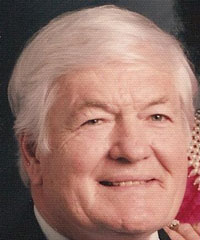 Dad, who served under Clarence Kopp (as bishop of the West District), says Bishop Kopp always brought him something worthwhile–an idea, an insight, something he had read or come across. I’ve heard Dad say that for many years. He said it again last week.
Dad, who served under Clarence Kopp (as bishop of the West District), says Bishop Kopp always brought him something worthwhile–an idea, an insight, something he had read or come across. I’ve heard Dad say that for many years. He said it again last week.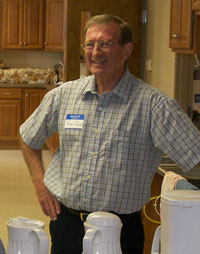 Ron Cook is pastor of the Salem United Brethren Church outside of Chambersburg, Pa. That’s where we held the Day of Missions last Saturday. Ron has pastored UB churches in Pennsylvania since the 1960s. My first memory of him comes from Rhodes Grove church camp. We spent many weeks there one summer when Dad directed the food service. Ron Cook was a new minister. I remember Dad saying to my Mom, “That Ron Cook is a really good young guy.” Or something like that. Hey, it was 40 years ago. But the gist was that Dad liked Ron, for whatever reason. And, therefore, I liked him. And always have. Imagine if Dad had given me a different first impression by saying, “That Ron Cook–I can’t believe the screwball thing he did today.” My young mind would have formed a different lasting impression. But thankfully, my view of Ron molded around the “good guy” label.
Ron Cook is pastor of the Salem United Brethren Church outside of Chambersburg, Pa. That’s where we held the Day of Missions last Saturday. Ron has pastored UB churches in Pennsylvania since the 1960s. My first memory of him comes from Rhodes Grove church camp. We spent many weeks there one summer when Dad directed the food service. Ron Cook was a new minister. I remember Dad saying to my Mom, “That Ron Cook is a really good young guy.” Or something like that. Hey, it was 40 years ago. But the gist was that Dad liked Ron, for whatever reason. And, therefore, I liked him. And always have. Imagine if Dad had given me a different first impression by saying, “That Ron Cook–I can’t believe the screwball thing he did today.” My young mind would have formed a different lasting impression. But thankfully, my view of Ron molded around the “good guy” label.


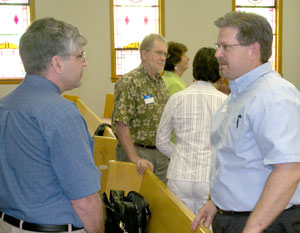 I do want to comment on something Alan MacDonald said. (That’s Alan on the right, talking to Global Ministries director Gary Dilley.) Alan MacDonald works with Wycliffe, serving as a laison to government and United Nations officials. It’s a pretty important job, one which fascinates me. Alan is highly respected within Wycliffe. I’ve enjoyed hearing him speak over the years and reading his writings, because he has a wonderfully insightful view of world missions, and a strategic vantage point.
I do want to comment on something Alan MacDonald said. (That’s Alan on the right, talking to Global Ministries director Gary Dilley.) Alan MacDonald works with Wycliffe, serving as a laison to government and United Nations officials. It’s a pretty important job, one which fascinates me. Alan is highly respected within Wycliffe. I’ve enjoyed hearing him speak over the years and reading his writings, because he has a wonderfully insightful view of world missions, and a strategic vantage point.
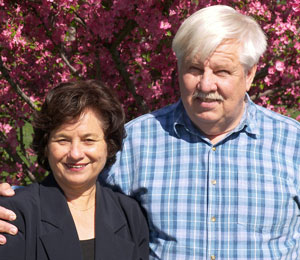 Roger and Marilyn Reeck were in town today. They are Wycliffe missionaries in La Ceiba, the third largest city in Honduras, situated on the north coast. I wrote a book about the life of Marilyn’s father, Archie Cameron, who basically started and built the United Brethren ministry in Honduras, which now has over 80 churches. An amazing man. That was the best, and most rewarding, piece of writing I’ve ever done.
Roger and Marilyn Reeck were in town today. They are Wycliffe missionaries in La Ceiba, the third largest city in Honduras, situated on the north coast. I wrote a book about the life of Marilyn’s father, Archie Cameron, who basically started and built the United Brethren ministry in Honduras, which now has over 80 churches. An amazing man. That was the best, and most rewarding, piece of writing I’ve ever done.
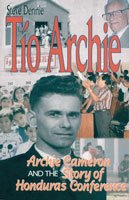 Archie Cameron died last fall. He had lived in Honduras since 1952. He was a pioneer, and part of the dying breed of missionaries who are “lifers”–who make missionary service in a foreign land their career. It was a great honor to do the book. Roger and Marilyn have told me that the book has been a blessing to other missionaries in Honduras, who value not only Archie’s testimony, but the background information I give about the country’s history. They mentioned one man who leads work teams to Honduras, and he always gives a copy to team members (and he’s not even United Brethren!). The book is used in teaching at the UB high school in La Ceiba.
Archie Cameron died last fall. He had lived in Honduras since 1952. He was a pioneer, and part of the dying breed of missionaries who are “lifers”–who make missionary service in a foreign land their career. It was a great honor to do the book. Roger and Marilyn have told me that the book has been a blessing to other missionaries in Honduras, who value not only Archie’s testimony, but the background information I give about the country’s history. They mentioned one man who leads work teams to Honduras, and he always gives a copy to team members (and he’s not even United Brethren!). The book is used in teaching at the UB high school in La Ceiba.



